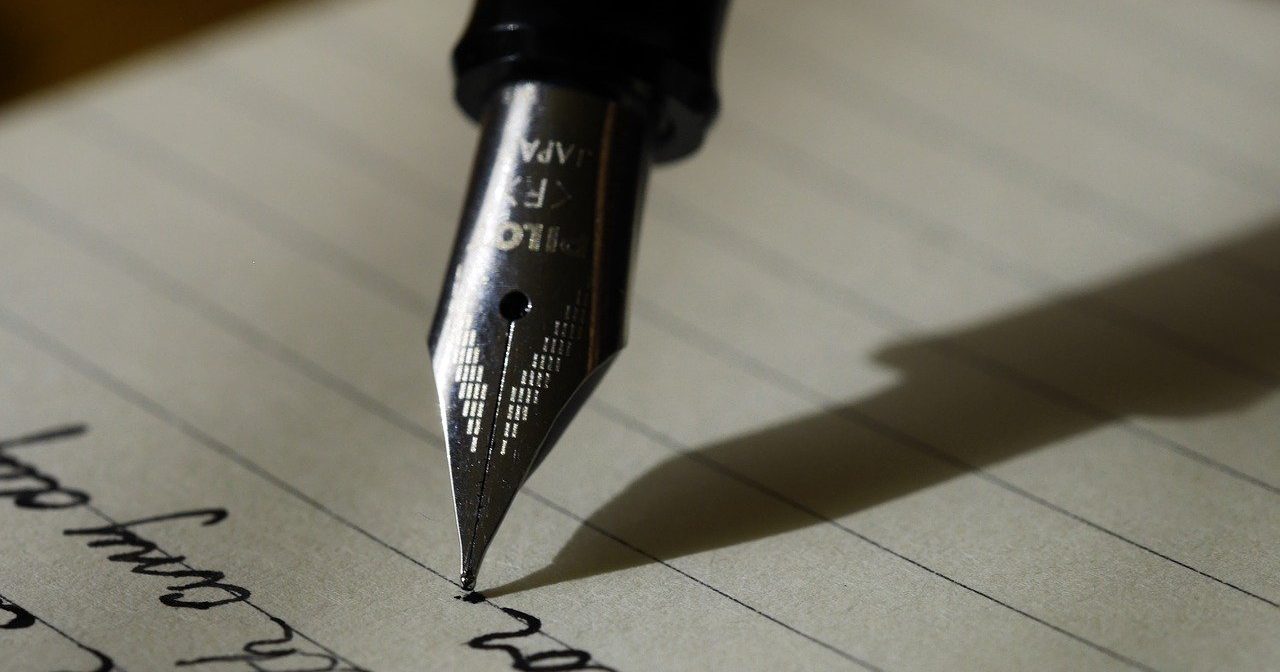Source
Every Shabbos prohibition is derived from an action that took place in the Mishkan: Writing was performed in the Mishkan when they labeled the kerashim (posts in the Mishkan) so that they would be able to be reassembled in the proper formation. Some add that a written record of donations was kept as well.
Any method of forming a letter, drawing or symbol is considered kosev; this includes writing, cutting out shaping and so on. The inverse of writing is erasing. Although we won’t be dealing with that directly, the two are intertwined, and erasing will come up throughout this article.
In order to be obligated on a Biblical level one must have written meaningful writing. This includes:
a) Any foreign languages, stenography, Braille, Morse code or anything else that may be considered unintelligible but has significant meaning is forbidden.
b) Fingerprinting (with intention to record fingerprint) or taking an impression of a baby’s foot is forbidden.
c) Any writing surface (including skin) is forbidden.
Library Books
Many library books have words on side of book that are broken upon opening the book. The Rema writes that it is permitted; since the book is made to open and close its not considered writing and erasing. The Levush argues. The consensus of the poskim is to be lenient and permit it, but if another copy of the book is available one should use that one. The same would apply to a ripped page in a book that is straightened to read but will inevitably separate.
Scrabble, Magnets and Blocks
Placing existing letters together in a non permanent fashion is not considered writing. Therefore one may play scrabble or play with blocks that don’t adhere to a surface or to each other.
Where there is a “chibur” or connection of the letter to a surface or to the other letters, such as with scrabble deluxe (where they click into the frame), other adhesives, or puzzles that fit together, magnets, and so on there is no apparent prohibition. However the Magen Avraham (OC 340:6) hypothesizes that just as attaching silver letters to a cloth is considered writing for a ‘get’, it is also considered writing to be liable on Shabbos. Many others disagree, in fact the Nishmas Adam 37:2 writes that there is no posek that holds like this. However Rav Moshe Feinstein (Igros Moshe OC 1:135) writes that the one should be stringent and that is how the Chayei Adam and the Mishnah Berurah pasken as well.
One may not cut fruit into specific shapes on Shabbos. You may however use an ice cream scooper or a similar instrument as long as you are not particular that it be a perfect circle.
One may not make jello in a mold on Shabbos. Rav Wosner rules that making jello is generally prohibited due to the issur of ‘Losh’.
Rabbinic Prohibitions
Any non permanent writing is Rabbinically prohibited. This is true both if the writing is temporary or if the writing surface is of a temporary nature. This includes:
Writing with frosting (which will melt) on a cake [or erasing frosting on a cake]
Writing on a misty window
Using an “etch a sketch”
Making pictures with ketchup or juice.
Asking a non-Jew to take your picture is considered Amirah L’Akum and prohibited.
Making a mark (even with a fingernail) for a significant purpose is considered kosev midrabanan.
Shinui – writing in an unusual manner such as your left hand (for a righty) or holding the pen in your mouth is forbidden on a Rabbinic level.
It is permitted to draw in the air or on a dry paper with your finger where there is no impression at all, or to make foot marks in the snow or mud inadvertently even if there are words on the bottom of your shoes.
One can obtain a mug (from Snapfish) that upon filling the mug with a hot liquid causes a picture to appear on the side of the mug. It is debatable whether this considered writing; all you’re doing is effecting a chemical reaction. Additionally it is only a temporary writing and would be Rabbinic. However one should be stringent. When there is no new picture being formed (such as the blue mountains on the Coors bottle) it is permitted.
Birthday Cake
As we mentioned, writing or erasing frosting on a cake is problematic. The Mordechai writes that one should not break a cookie that has letters written upon it. This is quoted as halacha by the Rema. Rav Ovadia Yosef writes that one may be lenient, Ashkenazim however must be stringent.
There are several exceptions:
One may give it to a child.
One may be lenient with breaking it in their mouth.
The prohibition does not apply when the letters are made of the same material as the cookie or cake, such as when made in a mold.
Prohibitions Derived from Kosev
All business transactions are forbidden on Shabbos because they are usually accompanied with writing. This extends to gift giving as well. Therefore if one brings a gift for their host on Shabbos they should either bring it before Shabbos or not present it as a gift. Similarly some shuls present a Bar Mitzvah with a set of Chumashim or the like, the Bar Mitzvah boy should be instructed to not acquire the gift on Shabbos.
With certain conditions it is permissible to buy Shabbos food on credit from a store on Shabbos itself:
a) The food is for Shabbos
b) The words buy or sell are not used
c)One may not say “I’ll pay you after Shabbos”, rather he must say “we will make arrangements after Shabbos”
d) One may not order by weight or price
Measuring is also prohibited because it is usually accompanied with writing. If the measuring is done for a mitzvah it is permitted.


thanks, very helpful, learning the sugya now.
What is the Halacha with regards to a Parochet that has letters on it? May I zip up my 2009 (yes 2009) World Series Champion Yankees Jacket (or an old worn out 88′ Dodgers one for the west coasters that haven’t accepted the Yankees superiority)b/c by doing so I am completing a letter (the N) or a word?
This weeks mention of the Halachik issue regarding library books clearly proves that Rabbi Haber’s recent move to the west coast has had nothinng but positive effects. Thank you for discussing an issue that is constantly prevalent to those of us who are from the open-minded minority. Continue the good work.
MTJster: if you are zipping in between letters then lechoreh there’s no problem. if you are zipping between a letter than it would have the same din as opening a book, although there might be a problem since it is more mechubar.
It seems someone has taken great liberty to speak on behalf of the YU community, and I would like to know their name. YUer, who are you? If you will not tell, maybe Rabbi Haber, you can check your computer and expose their email address?
Maase Shehaya –
This question was posed to Rabbi Shimon Eider ZT”L while he was providing the hechsher to the LaVista Hotel in South Fallsburg NY in the mid 80’s. I recall his psak at the time was that cutting through letters of a birthday cake did NOT pose an halachik issue on Shabbos even when the letters were made from separate and distinct icing material. Perhaps this psak can be corroborated in his Hilchos Shabbos seforim as well. — Yossi Shandelman
I read your blog on Kesiva, and not one time did you bring. R. Scneur Zalman the mechaber of the Shulchan Aruch Harav. To completly ignore his Shulchan Aruch, says much about Rabbi Tzvi Habers’ knowledge and piety
Since YU, MTJ and Chabad have been represented, it is only right that the rednecks get in on the party.
I read your blog on Kesiva, and not one time did you bring Coors Light, one of Coors’ finest beers.To completely ignore the white lettering that turns blue when chilled, says much about Rabbi Tzvi Haber’s knowledge and piety.
Perhaps R. Habers failure to quote Lubavitcher sources, in fact indicates his knowledge and piety. We live in times during which messianism has become the norm of the day. The radical and dominant sect of Ludavich attempts daily to infiltrate and control normative Judiasm. We are in the midst of a battle with those who warp Judiasm and all that we hold dear. Kudos to you R. Haber for attempting to stand up to the perversion of modern day Lubavitch, and may we succeed in defeating these enemies of Judiasm.
I have read the reply by elisha. This has nothing to do with Chabad, this has to do with intellectual honesty.
The Shulchan Aruch Harav is,and has been accepted in all of Klall Yisroel. Notice,my original comment has been directed against Rabbi Tzvi Haber. I am sure he can defend himself he definitely does not need your venom injected into an objective observation. To summarize;all your feeble minded attempts to turn this into a Chabad hate fest holds no water when discussing the Shulchan Aruch Harav.
Although I risk betraying my true levels of knowledge and piety with this, I have perused the Shulchan Aruch Harav at length where he discusses the Melacha of Kosev in which he follows the pattern of the Shulchan Aruch and doesn’t discuss it much at all. I could not find any chidushim that were not already covered by the Shulchon Aruch and Rema, and my style does not usually allow for quoting all who concur with the Shulchon Aruch.
Thank you Rabbi Haber for your honest and forthright response.
What is allopwable in the case where a new student MUST attend and take part in orientation (enteringv a new college) that is held only on Friday and Saturday (a one time occurence). and must sign his/her name on school documentrs (e.g. financial aid, class schedules or other such papers).. The signing would it seems be done as part of a mitzvah, and is not creating anything new since the person comes into the school with their existing name….No fingerprinting is done either.